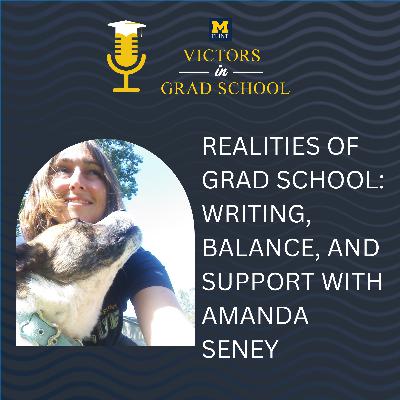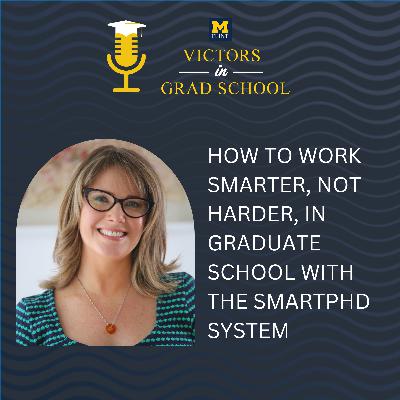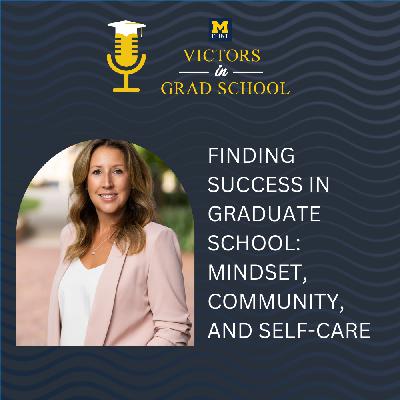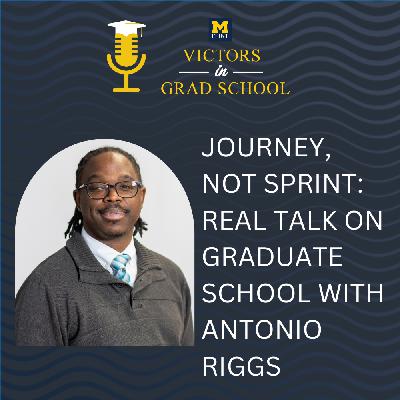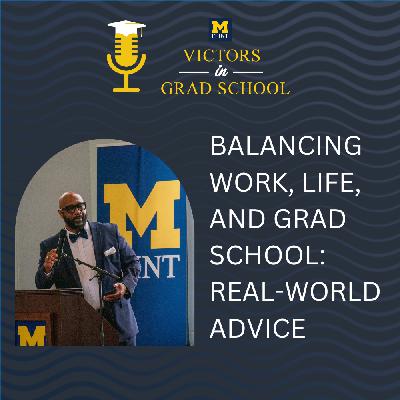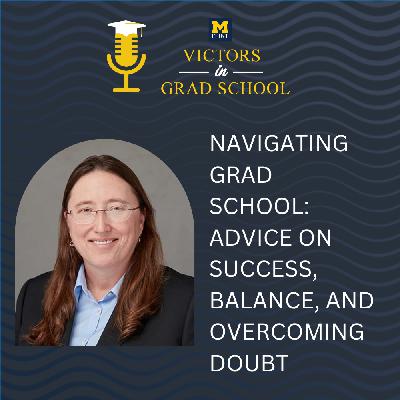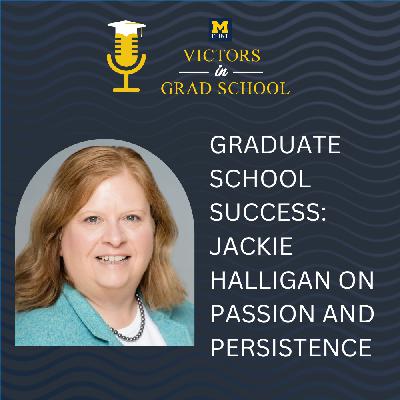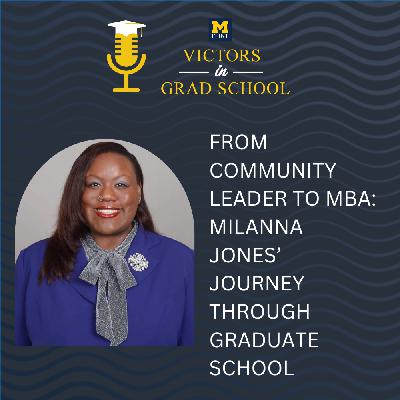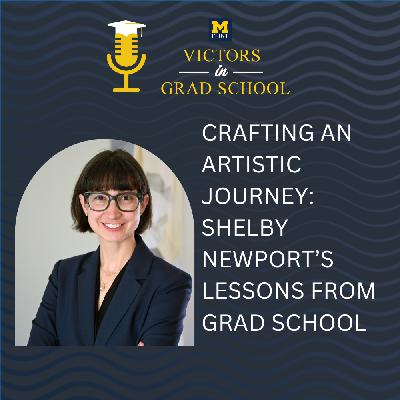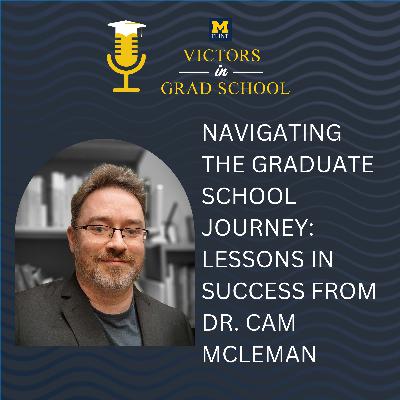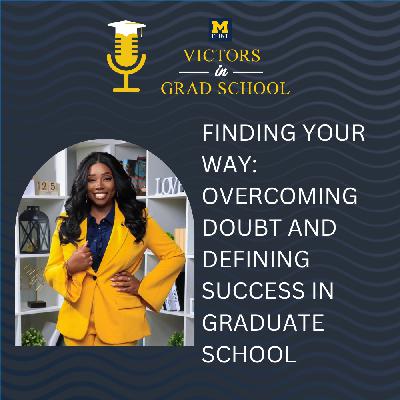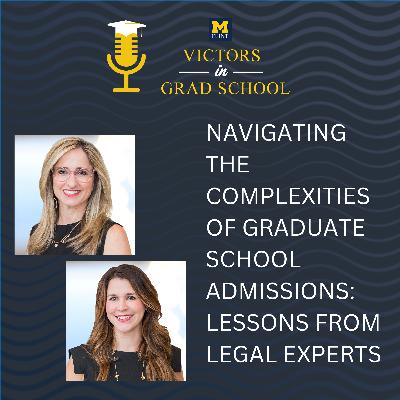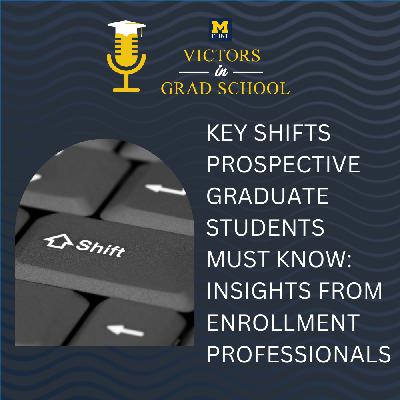Realities of Grad School: Writing, Balance, and Support with Amanda Seney
Description
Are you thinking about graduate school, or perhaps already navigating its hills and valleys? The latest episode of Victors in Grad School is a must-listen for anyone considering this transformative step. Dr. Christopher Lewis sits down with Amanda Seney, the Writing Center Academic Program Specialist at the University of Michigan-Flint, who shares her unique path through higher education and the invaluable lessons learned along the way.
Amanda’s story is one of perseverance, growth, and self-discovery. After a significant gap between starting and finishing her undergraduate studies, Amanda returned to academia more determined than ever. She didn’t just finish her degree—she flourished, embracing the experience by double-majoring and then moving seamlessly into a graduate program. For Amanda, the decision to pursue graduate studies wasn’t just about credentials; it was about personal growth and opening new doors, even when the destination was unknown.
Transitioning from undergraduate to graduate school, Amanda noticed a significant shift in expectations—not just from instructors, but from herself. She discusses the journey from following directions to taking initiative, where research projects became opportunities for self-direction and exploration. Amanda shares how this process required greater personal accountability, self-advocacy, and time management—skills that don’t just make for successful students, but for resilient professionals.
A recurring theme in Amanda’s reflection is the presence of “imposter syndrome” and self-doubt—a feeling familiar to almost every grad student. Her advice? Lean on support systems, whether it’s faculty, peers, or campus resources. Amanda credits her relationships with instructors and the collaborative atmosphere at UM-Flint as key to overcoming her doubts and achieving her goals. For non-traditional students balancing family, work, and school, Amanda is candid about the struggles of finding balance and sets realistic expectations: it’s not about perfection, but doing your best with the support you have.
Perhaps most eye-opening is Amanda’s emphasis on the importance of revision in graduate-level writing, advocating for multiple drafts and peer feedback. She reminds us that writing well is a process—and seeking help is a sign of strength, not weakness.
As Amanda’s story reveals, graduate school is not just an academic pursuit, but a journey of self-discovery, resilience, and community. If you’re pondering this path, want practical tips, or just need encouragement, tune in to this enlightening episode. Amanda’s journey isn’t just inspiring—it’s a roadmap for anyone aspiring to thrive in grad school.
Take a listen and equip yourself for your own victorious journey in graduate school!
TRANSCRIPT
Dr. Christopher Lewis [00:00:01 ]:
Welcome to Victors in Grad School, where we have conversations with students, alumni, and experts about what it takes to find Success in graduate school.
Dr. Christopher Lewis [00:00:11 ]:
Welcome back to Victors in Grad School. I'm your host, Dr. Christopher Lewis, Director of Graduate Programs at the University of Michigan, Flint. Really excited to have you back again this week. As always, every week, you and I are on a journey together. We have an opportunity to be able to learn, to grow, to be able to learn from others in their experiences to help you in the journey that you're on. It truly is a journey because no matter where you are, there are things that you can do along the path to be able to prepare you, as well as to help you to find success as you go through that experience for yourself. That's why every week, I love being able to bring you different people with different experiences that can talk about the graduate school journey that they had for themselves.
Dr. Christopher Lewis [00:00:59 ]:
Things that worked, things that maybe didn't work, things that they learned along the way that can give you some tools for your own toolbox and help you on the journey that you're on. This week, we got another great guest. Amanda Senti is with us today. And Amanda is the Writing Center Academic Program Specialist at the University of Michigan, Flint. She works with graduate students on writing and helps them with the journey into being a graduate school writer. Because it is different. It is different in that journey from undergrad to grad, there are different expectations. Not only expectations from faculty, but expectations you have to put on yourself as well.
Dr. Christopher Lewis [00:01:42 ]:
And Amanda is here to help students along that pathway. And she learned a lot of the things that she's helping students with in her own journey. And I'm really excited to be able to talk to her about her own experience and to have her share some of those today. Amanda, thanks so much for being here today.
Amanda Seney [00:01:58 ]:
Well, thank you so much for having me.
Dr. Christopher Lewis [00:02:00 ]:
Now, I know that you did your undergraduate work at the University of Michigan, Flint, and at some point, at some point in that journey, you made a choice. You made a decision that you wanted to continue on. You wanted to get a graduate degree. Bring me back to that point and tell me more about that decision and why you made that decision to continue your education.
Amanda Seney [00:02:23 ]:
Yeah. Wow. Okay. So that is kind of a long story. I guess I should say that I started undergrad right after high school, but I had also gotten married at the same time. And my husband was in the military. We were out of state. There was a lot going on.
Amanda Seney [00:02:35 ]:
And then we had kids, and I was not able to finish my undergrad at that time. And so I had a very long gap in between when I first started and then when I came back to finish. It was about 14 years before I came back to U of M to finish my undergrad. So then I started, and I think I had something like 90 some credits that I. I brought with me. I transferred in. And so I really could have finished fairly quickly. But I was so much enjoying the undergraduate experience and I was learning so much about myself and just about the world in general that I thought, well, okay, while I'm here, I also think, I think I'll do a double major because I'm not done with this undergrad stuff yet.
Amanda Seney [00:03:13 ]:
And so I decided, okay, I'm going to do a double major. And so that extended my time a little bit. And I think it ended up being about two and a half years to finish my undergrad. But then I still just didn't feel like I was done because I was growing so much, just so much as an individual, as a member of society, as a. As an employee that I wasn't ready to be done yet. And I wanted to see what I could do at a graduate level. And so I just decided to make that kind of seamless transition at the time since I was kind of in the swing of school anyway at that point. So that was why I decided to keep going.
Amanda Seney [00:03:43 ]:
And I just thought it would open more doors for me. I didn't know what those doors were going to be, but I wanted to see where it would go.
Dr. Christopher Lewis [00:03:49 ]:
So you went to that undergraduate degree. You made the decision to go to graduate school. As a lot of students do, they have to figure out for themselves what's the best program, program. Where should I go? You made a decision to stay at the University of Michigan Flint to go into a graduate program in English language and literature and continue your education there. Talk to me about that process for yourself and that decision for yourself. And what made you decide that the University of Michigan Flint was the right program for you?
Amanda Seney [00:04:18 ]:
Well, partly it was. I just really like the university. For one thing. I know that we have so many support system, and at that point I was familiar with so many of the resources. I also really liked the campus job that I had, which was working at the writing center. And I knew I could continue doing that because it is a great place and I love it and I wanted to be able to stay there. So that was part of the draw for the University of Michigan. I mean, honestly, goodness, it's just the quality of instruction is so high because I have been in other places, and they were also very good.
Amanda Seney [00:04:45 ]:
But I really like what I had seen here. I liked that I knew they were going to be smaller class sizes so that I could continue those relationships that I had built with instructors. There was just so much with that now. Why the English language and literature in particular? I knew I wanted something in the humanities because I figured that's just what's close to my heart, and that's where I wanted to go, I guess. And I was also definitely working on creative writing at the time. And so that English language and literature gave me a lot more opportunity to do creative projects, which was important to me at that time, period.
Dr. Christopher Lewis [00:05:15 ]:
So every student that goes to graduate school has to make a transition. I mentioned at the beginning that there's transition in expectations and how you're taught, but also there's transitions in how you have to write, how you have to think, how you have to process. There's a lot of different ways of learning that happens as you go into graduate school and go through graduate school. Talk to me about those transitions for yourself. Because you found success, you got through the degree, you went through that process. What did you have to do to set yourself up for suc

